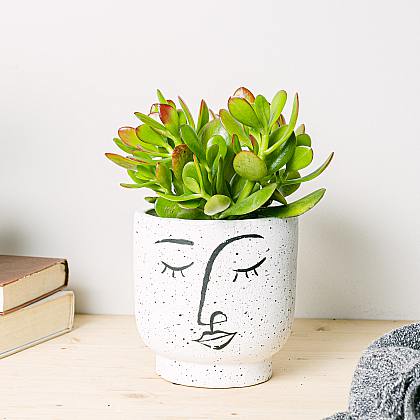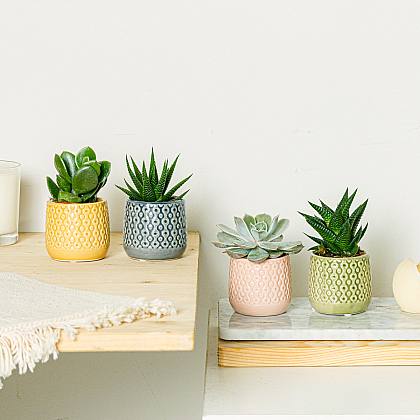Practical tips and recommendations for caring for your plants at home or in the office
Plants are a beautiful and beneficial addition to any home or office. However, many people may be intimidated by the care and maintenance of plants
Plants are a beautiful and beneficial addition to any home or office. However, many people may be intimidated by the care and maintenance of plants. With these practical tips, you'll be able to learn how to choose the right plants for your space, how to provide them with the right amount of light and temperature, how to water them correctly, and how to nurture them properly. In addition, we will provide you with information on how to maintain a pest and disease-free environment, how to regularly prune and maintain your plants, and specific tips for indoor and outdoor plants. Join us on this journey to discover the wonderful world of plants!
Choose the Right Plants for Your Space
Choose the Right Plants for Your Space
When choosing plants for your home or office, it's important to consider the available space and environmental conditions. Each plant has specific light, temperature, and humidity requirements, so it's essential to select those that are best suited to your environment. If you have a space with plenty of natural light, you can opt for plants that require direct sun exposure, such as cacti or succulents. These plants are ideal for sunny spaces and don't need frequent watering.
If your space has little natural light, it's a good idea to opt for indoor plants that are well suited to shade, such as ferns or indoor palms. These plants can survive in low-light conditions and require less watering. On the other hand, if you have a garden or a large balcony, you can choose outdoor plants that thrive in more open environments and exposed to the sun.
In addition to space and light, it's also important to consider the size of the plants. If you have a small space, you can opt for small plants or even hanging pots to take advantage of the vertical space. On the other hand, if you have a large garden, you can afford to have larger plants.
In short, when choosing the right plants for your space, you should consider both the environmental conditions and the size available. This will ensure that your plants grow and develop properly, adding beauty and freshness to your environment.
The Importance of Light and Temperature
Light and temperature are two crucial factors for plant growth and health. Each species has specific light and temperature needs, so it's important to do your research before choosing which plants to place in your home or workplace. Plants need light to perform photosynthesis, the process by which they convert solar energy into food. If a plant doesn't get enough light, its growth will be limited and may even die. On the other hand, if a plant receives too much direct sunlight, it can also become damaged and burned. It's important to find a balance and place your plants in a spot that gets the right amount of light based on your needs.
When it comes to temperature, plants also have specific requirements. Some plants prefer warmer temperatures, while others need cooler weather. In addition, sudden changes in temperature can be detrimental to plants, especially if they are drastic or frequent. It is important to maintain a constant and suitable temperature for our plants.
In short, light and temperature are fundamental factors in plant care. It is important to know the specific needs of each species before choosing which ones to place in our home or workplace and ensure that we provide them with the right environment for their healthy growth and development.
Watering: Not Too Much, Not Too Little
Watering is a critical part of plant care, as it provides the right amount of water for plant growth and development. However, it is important to find the right balance, as overwatering or underwatering can have negative consequences for plants.
Overwatering can cause root rot and encourage fungal and disease growth. In addition, excess water can hinder the plant's absorption of nutrients and affect its ability to photosynthesize. On the other hand, underwatering can cause plants to dry out and die.
To avoid these problems, it's important to know the water needs of each individual plant. Some species require more water than others, so it is necessary to research their characteristics before watering them. Additionally, it is advisable to check the soil moisture before watering, as this can indicate if the plant needs more water or if it still has enough.
Another aspect to consider is the quality of the water used for irrigation. Water with high levels of chlorine or mineral salts can damage plant roots in the long run. Therefore, it is recommended to use filtered water or let tap water sit for at least 24 hours before watering.
In short, it's important to find the right balance when watering your plants. Looking at the individual needs of each species and taking into account the quality of the water used are key factors for optimal irrigation. With proper care, our plants will be able to grow healthy and beautiful.
The Vital Role of Plant Nutrition
Plant nutrition is a fundamental aspect of plant growth and development. The nutrients they absorb from soil or water are essential for their survival and productivity. Most plants need three main nutrients: nitrogen, phosphorus, and potassium, but they also require other elements in smaller quantities, such as calcium, magnesium, and iron. A lack of nutrients can affect the health of plants and reduce their ability to produce flowers or fruit. On the other hand, an excess of nutrients can also be harmful and cause leaf burn or root damage. It is important to find the right balance in the feeding of the plants. There are several ways to provide nutrients to plants, such as chemical or organic fertilizers, compost, and green manure. Chemical fertilizers are a quick and efficient way to supply nutrients, but overuse can harm the environment. organic fertilizers are a more sustainable and environmentally friendly alternative. Compost is an excellent source of organic nutrients and can be easily produced at home from food scraps and other organic waste. Green manure is another interesting option that involves planting specific crops to improve soil quality and provide nutrients to other plants. In conclusion, plant nutrition is a crucial aspect of plant care, so it is important to know the specific nutritional needs of each species and provide them with the right nutrients in a balanced and sustainable way.
Maintain a Pest and Disease Free Environment
Maintaining a pest- and disease-free environment is critical to proper plant care both at home and in the office. Pests, such as spider mites, aphids, and mosquitoes, can weaken plants and spread disease, so it's important to take preventative measures to prevent them from appearing. An effective way to keep pests away is to regularly clean plant leaves, as this removes any debris that might attract insects. In addition, it is recommended to periodically check plants for signs of infestation, such as leaf spots or deformities, and to take immediate action if any pests are detected.
Another important aspect of preventing pests and diseases is to make sure you provide good drainage for your plants. Overwatering can encourage fungus and other diseases, so it's essential to allow water to drain properly. It is also recommended to avoid stagnant water in the dishes or pots, as this creates an environment conducive to the proliferation of insects and harmful microorganisms.
In addition, it is helpful to use natural pest control methods, such as introducing beneficial insects or using organic products. These methods are less harmful to the environment and help maintain a natural balance in the ecosystem of our plants.
In short, maintaining an environment free of pests and diseases is essential to ensure the health and vitality of our plants. By following these practical tips, we can prevent the appearance of unwanted pests and enjoy a green and healthy environment both in our home and in our workplace.
Pruning and Regular Maintenance
Pruning and Regular Maintenance are essential aspects to ensure the healthy growth and beauty of plants both indoors and outdoors. Pruning involves the selective removal of branches or parts of a plant in order to improve its shape, stimulate the growth of new shoots, and eliminate any damage or disease. It is important to prune at the right time, usually during the spring or fall, when the plant is in its active growth phase. When pruning, clean, sharp tools should be used to avoid damaging the plant. In addition to pruning, regular maintenance involves tasks such as removing wilted or diseased leaves, controlling weeds, and cleaning pots or planters. These activities help maintain a clean environment free of pests that could negatively affect plant development. In addition, regular maintenance makes it possible to detect any problems or specific needs of each plant, such as changes in light or temperature, in time. In short, spending time on pruning and regular maintenance is critical to ensuring that plants stay healthy and beautiful, providing a pleasant environment both at home and in the office.
Specific Tips for Indoor and Outdoor Plants
Specific Tips for Indoor and Outdoor Plants
When it comes to plant care, it's important to consider whether your plants are indoors or outdoors. Houseplants require certain special care to ensure their healthy growth. First of all, it is essential to choose plants that adapt to the light conditions of our home or office. Some houseplants, such as ferns and palms, prefer shade, while others, such as cacti and succulents, need direct sunlight.
In addition to light, it's also important to consider temperature when caring for houseplants. Avoid placing them near cold drafts or sources of intense heat, as this can negatively affect their growth.
When it comes to watering, it's essential to find the right balance to avoid both overwatering and underwatering. Most houseplants require regular but moderate watering. Make sure the water drains properly and avoid leaving stagnant puddles in the pots.
Plant nutrition also plays a vital role in houseplant care. Use specific fertilizers for houseplants and follow the recommended instructions to ensure proper feeding.
Finally, maintain an environment free of pests and diseases. Regularly inspect your plants for signs of insects or fungi and take preventative or corrective measures if necessary.
By following these tips specific to houseplants, you will be able to enjoy a beautiful and healthy garden within your home or office. Always remember to research the specific needs of each type of plant and provide them with the proper care to ensure their well-being.
In short, caring for plants at home or in the office can be a relaxing and rewarding activity. However, it is important to note that each plant has specific needs and requires individualized care. Choosing the right plants for the available space, the right light and temperature, balanced watering, proper nutrition, and regular maintenance are key factors in keeping our plants healthy and beautiful. In addition, pest and disease prevention is essential to avoid major problems. While plant care may seem like a simple task, it can become a fascinating and enriching hobby. We invite our readers to explore this green world and share their experiences and tips with other plant lovers


